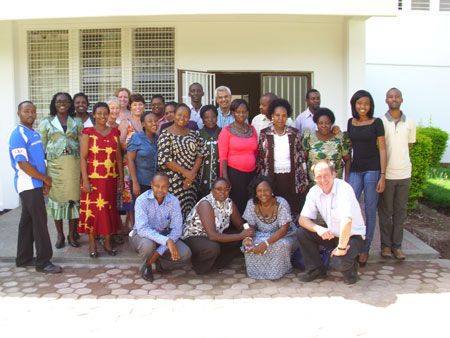First African PD Nurse Specialist Course
Kilimanjaro Christian Medical College
Moshi, northern Tanzania
December 10-14, 2012
 This course was jointly funded by the International Parkinson and Movement Disorder Society (MDS) and the World Federation of Neurology. Participants were invited from throughout East Africa, with the pre-requisite that they would return to work in neurology departments in their own country, and would have access to the care of people with Parkinson's disease (PD). We had participants from Rwanda (3), Uganda (1), Ethiopia (2), Kenya (4), with 2 also invited from Nigeria and the remaining 10 from Tanzania, including 2 occupational therapists and 3 physiotherapists.The international faculty comprised of Professor Richard Walker, Dr Catherine Dotchin, Louise Ebenezer, Lynda Hind (all from UK) and Dr Juzar Hooker (Nairobi, Kenya). Local contributions were also provided by Victor Minde (physiotherapy) and Oliva Msuya (PDNS).
This course was jointly funded by the International Parkinson and Movement Disorder Society (MDS) and the World Federation of Neurology. Participants were invited from throughout East Africa, with the pre-requisite that they would return to work in neurology departments in their own country, and would have access to the care of people with Parkinson's disease (PD). We had participants from Rwanda (3), Uganda (1), Ethiopia (2), Kenya (4), with 2 also invited from Nigeria and the remaining 10 from Tanzania, including 2 occupational therapists and 3 physiotherapists.The international faculty comprised of Professor Richard Walker, Dr Catherine Dotchin, Louise Ebenezer, Lynda Hind (all from UK) and Dr Juzar Hooker (Nairobi, Kenya). Local contributions were also provided by Victor Minde (physiotherapy) and Oliva Msuya (PDNS).
The course was run in English and included diagnosis, drug treatment, motor symptoms, non-motor symptoms, physiotherapy and information provision (plan to develop appropriate information for sub-Saharan Africa). On one afternoon 2 local PD patients attended to tell the participants what it was like to live with PD, and this also allowed demonstration of physical signs.
Useful websites, including MDS and Parkinson's UK, were demonstrated. Each participant has been given a UK PDNS as an email mentor and will produce a report after 6 months giving details of the numbers of patients with PD, and the clinical spectrum, as well as the challenges where they work.
Despite many challenges, not least getting the participants to Moshi, the course was a great success in large part due to the excellent hosting by the Nursing School. The group as a whole bonded very well as the week went by and the course was very interactive. They are keen to provide ongoing mutual support. Despite the many other challenges to the care for PD patients in SSA, such as access to affordable and sustainable drug treatment, we have raised awareness and established a cohort of interested and educated health professionals to help take on the challenge. Evaluation was very positive and we hope to run similar courses in other regions of Africa in the future.






